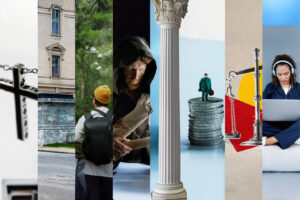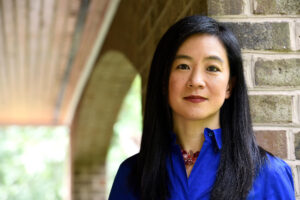
Every year, the SNF Agora Faculty Grants program supports scholarly work happening across the university that seeks to deepen our understanding of ways to improve civic life. This work begins in thought, grows through study and dialogue, and reaches into the world with care. It unfolds slowly, often away from headlines, but with a steady purpose: to connect research, reflection, and civic collaboration to the shared project of democracy.
These grants provide support for Johns Hopkins faculty whose work bridges academic insight and the practice of pluralistic democracy. Most awards provide up to $5,000, with one to two each year receiving $10,000 or more in support. All focus on projects that reflect SNF Agora’s mission to strengthen democracy through civic engagement, research, and open dialogue. The program intentionally invites ideas from varied Johns Hopkins schools and disciplines to encourage new ideas and spark connection across fields.
This year’s grantees explore themes that shape our collective lives. Their work looks at history, inequality, law, faith, masculinity, and trust. Their projects will take them to lecture halls and the halls of government and span both early legal texts and emerging technologies. Each project seeks to surface or model different approaches to building modern agoras that can fuel healthy democracies.
Johnathon Ehsani, associate professor at the Bloomberg School of Public Health, and Beth Resnick, assistant dean for practice and training, will launch a dialogue series between faith leaders and public health professionals. Their project addresses the trust gap that often divides scientific expertise and religious belief. By building relationships across different worldviews, they aim to strengthen community partnerships and enhance public health outcomes.
Jennifer Kingsley, director of the Program in Museums and Society, and Virginia Jewiss, director of public engagement at the Alexander Grass Humanities Institute, will convene a public forum to address the unresolved future of Baltimore’s Confederate monuments. Eight years after their removal, the city still holds questions about commemoration, justice, and public space. This program will include film screenings, community input, and civic dialogue. It will not provide final answers, but it will create space for shared responsibility.
Christopher Lemon, associate director and faculty co-director of clinical programs at the Johns Hopkins Institute for Planetary Health, will gather stories of men who confront crises. His interviews explore how men adapt, care, and cope in environments of collapse. A public storytelling series will feature these narratives, exploring a more honest, grounded, and resilient model of masculinity in the face of ecological upheaval.
Anne Lester, associate professor of medieval history, will build on her long-running course on English constitutional law by developing public-facing videos and events. Lester will partner with students to create short lectures and host a Substack series that ties medieval and early modern legal history to current debates about democracy and constitutionalism. Her work brings deeper roots to today’s civic questions and makes the history of law more accessible to the public.
Andrew Perrin, SNF Agora professor of Sociology and Jeanne-Marie Jackson, professor of English, will host a public event in spring 2026 that explores how the humanities can continue to serve democracy. They will bring together national thought leaders to reflect on the public role of universities. The conversation will take place in partnership with the Grass Humanities Institute and explore what remains possible when institutions commit to a shared inquiry.
Kris-Stella Trump, associate research professor in the Department of Political Science, studies how Americans perceive wealth. Her research examines whether extreme concentrations of wealth remain invisible in the public imagination and if that invisibility deepens inequalities. With support from the SNF Agora Faculty Grant, Trump will launch a nationally representative survey to understand how language, visibility, and media shape political opinions about wealth. Her findings may reshape how we talk about fairness, policy, and economic justice.
Inés Valdez, professor of political science; Ho-fung Hung, professor in political economy; Robbie Shilliam, professor and chair of the Department of Political Science; and Josh Simon, associate professor of political science, are leading a project that explores how global political and economic forces shape democratic backsliding, with particular attention to insights from Latin America and the Global South. They will organize two academic convenings: one focused on Latin American traditions such as dependency theory, and another centered on political economy in the Global South. The project will examine how inequality, marginalization, and shifting global power structures affect democratic resilience. It will also produce public-facing interviews by graduate students and support scholarly writing that brings these perspectives into wider democratic discourse.
Alexandre White, assistant professor in the Department of Sociology at Johns Hopkins, and Mari Webel, associate professor of history at the University of Pittsburgh, will relaunch a cross-disciplinary web and podcast series that brings doctors, historians, and public health leaders into open conversation with the public. Epidemic//Endemic draws from the pandemic-era original and expands it into a platform that makes health knowledge more transparent and more democratic. Viewers will hear from practitioners across diverse fields, who will answer public questions and clarify contested areas. The series will air on YouTube and podcast platforms, inviting the public into the discourse that shapes their lives.
These faculty projects remind us that democracy is built over time, shaped by people who pay attention, ask questions, and are committed to the work of understanding. Through research, teaching, storytelling, and public engagement, this year’s grantees participate in that ongoing labor, demonstrating what happens when care, curiosity, and civic purpose come together.

